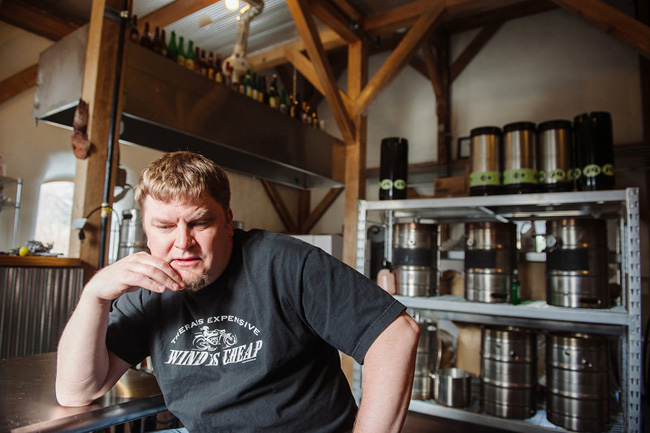
The beer business hasn’t yet killed Ken Thiemann, but it has made at least one credible attempt. As the founder, head brewer, and general go-to guy for Borealis Fermentery, Thiemann spent more than four years building an energy-efficient straw bale and stucco structure north of Knife River that serves as his home and brewery.
It is from the roof of this Belgian-inspired, roughly 30-foot tall structure that Thiemann, trying to tack down a loose bit of roofing, fell head first. As a former ski bum familiar with high-stakes acrobatics, Thiemann thought to himself: “I’ve got to stick this landing.”
He managed to somersault, land on his feet, and roll. After the fall, “I started moving my fingers, and I was like: ‘Wow, nothing’s wrong.’ And then I got up to walk away and” (here he makes a horrible crunching noise) “everything was broken.”
After a local X-ray (which detected nothing amiss) and a few weeks on crutches, Thiemann went for an X-ray examination in Duluth. “The first thing I heard from the other room was ‘Ohhhh,'” he recalls. “And I said: ‘What in the world is that? You’re not supposed to say, ‘Ohhh.'” The fall had snapped the tendons in both of Thiemann’s feet.
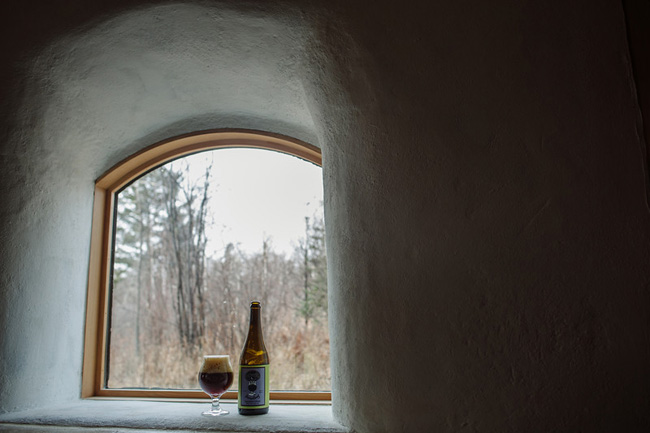
The fall, countless delays, the death of both his parents from cancer, a year spent sleeping in an uninsulated shed in sleeping bags (accompanied by his wife, Jen, whose patience surely ranks somewhere between “saintly” and “godly”), and innumerable challenges both bureaucratic and physical stood in the way of Thiemann and the completion of his dream, which he describes as his “sacred, bittersweet cathedral of Belgian beer.”
The building is composed of a timber frame, pegs (and no nails), straw bales, and tens of thousands of pounds of hand-applied stucco — two coats on the interior walls and three on the exterior walls, with a south-facing wall more exposed to the elements in order to gather passive solar warmth.
“If you’re not a badass, don’t try to do it this way,” says Thiemann, who launched Borealis in April 2012 and spent a good percentage of this interview attempting to teach others through his own Job-like story of stubborn suffering. “I’m not saying I’m a badass, but I’m saying everybody including my wife wanted to walk away from this and quit. All the locals were like: ‘This guy is a nut.’ But now all the contractors that laughed at me are coming by and they want a tour. All the people who said, ‘You can’t start a brewery and make it successful’… well, I can’t brew enough beer [to satisfy demand].”
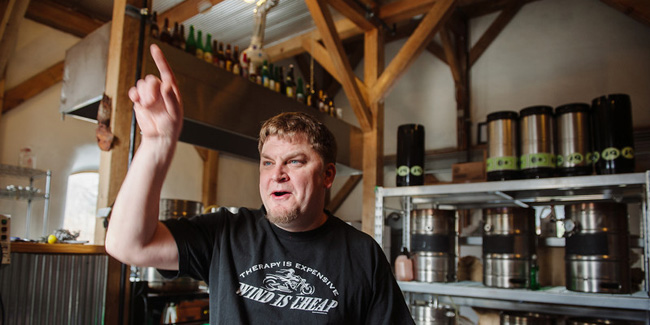
Part of that is because the Belgian-style beers of Borealis are popular, selling at Duluth bars and restaurants like the New Scenic Cafe, Beaner’s Central, the Lake Avenue Restaurant & Bar, and Tycoons. And part of that is because Thiemann brews — five or six days a week — on a pilot system, with a maximum capacity of one barrel a day. He intends to scale up soon, he says, but he’s looking for a way to do it without loans. “I’m fully aware that debt can be used as a tool, but I don’t like debt,” he says.
Contrast Thiemann’s business plan — a fiercely driven lone wolf brewer, no loans, a self-built brewery, a tiny production capacity — with that of the soon-to-open, 50-barrel capacity Bent Paddle Brewing Company, and you are presented with a marvelous snapshot of the Duluth area’s capacity for creative brewing. The smooth and professional team at Bent Paddle is utilizing every modern business and communications tool they can lay their hands on; the rough-hewn, bluntly spoken Thiemann calls out corporate culture (“I personally believe that corporate America is pulling democracy apart”) and worries about someday becoming the kind of big, impersonal business that he hates.
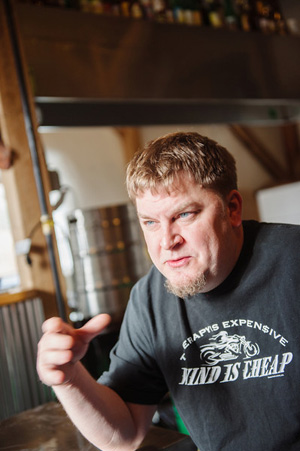
“It’s brutal, it’s stupid, you don’t make as much money,” he says of his business plan. “Instead of going through a distributor, I wanted to start by going to the restaurants, going to my accounts, sitting down with the head chef or the buyer and shaking his hand,” he says. “If they have a problem with the beer, I want to hear about it. I’m not perfect. I’m one dude, man; I’m burned out. This place hurt me. I gained 25 pounds. I used to be a marathon runner. But if anyone has a problem with my beer, they have my cell phone number. The thing I wanted to stand for was integrity — you stand behind what you do.”
We tried two of Thiemann’s three regularly available beers, his La Lune Special Ale and his Speckled Ghost Abbey Ale and were surprised — stunned, even — to find the output of this hard-charging, fiercely individualistic metalhead to be … mellow. Balanced. Thoughtful, delicate, subtle. In a word: sophisticated, the kind of beer that invites careful consideration and real savoring.
As Thiemann tells it, many American brewers, when evoking Belgian styles, go overboard, bombing their customers with massive doses of spice and other flavors. “Belgians wouldn’t water the plants with it,” Thiemann says. “Those [American brewers] do with witbier what Chinese restaurants did with Chinese food to get tons of American fans,” by simplifying and emboldening sweetness and other flavors to make a louder, dumber, more marketable experience. “A lot of people think a Belgian is like ‘BOOM’ in your face: ‘You want a licorice beer? Here’s some anise for you!'”
Some of Thiemann’s interest in making a subtler Belgian beer comes from first-hand exposure to the real thing: His love of beer and brewing was stoked and intensified by time he spent working as a canal engineer in Holland in 2002. “This was my chance to ride my bike to the breweries and not just get a tour, but schedule things with the brewers to see how they do their stuff,” he recalls.
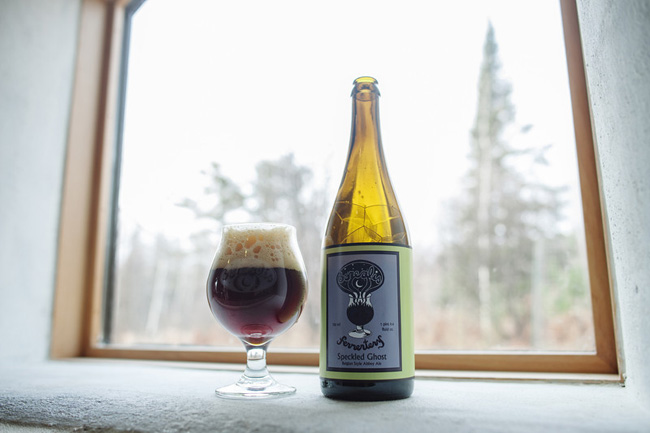
He ended up back in the States as an environmental engineer in Two Harbors. “I was working 80 hours a week as a sewer engineer, which is exactly as much fun as it sounds,” he says. “I sat there every night listening to Norwegian black metal, watching 22 miles worth of sewer. And then one of the reasons we [started Borealis] is my wife said: ‘This isn’t living. We moved up to Minnesota to go camping and enjoy the woods…’ It came down to ‘You either quit being an engineer or it’s not going to work out for us.'”
Thiemann’s trip to the starting line has been exhausting, but he says that the view from his monastery-inspired home on the North Shore is a good one.
“I don’t make as much money as I did when I was an engineer, but there are so many more things out there than you can put a monetary value on,” he says. “In my mind, I’m a rich guy. In my mind, I’ve summited a mountain. And I don’t care if I fall off now.”
You can taste Borealis Fermentery beers in the Duluth area, at locations including New Scenic Cafe, Beaner’s Central, Lake Avenue Restaurant & Bar, and Tycoons Zenith Alehouse; Thiemann doesn’t have a tap room or tour program set up at his brewery / home.
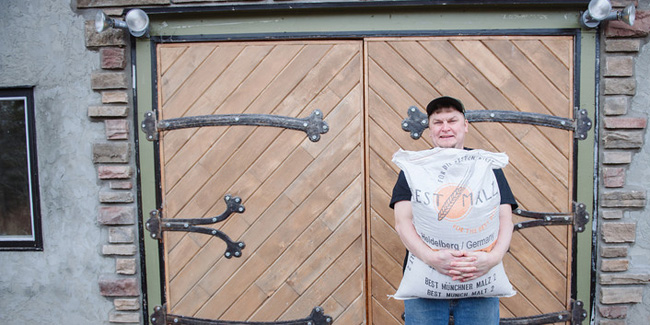

Comments are closed.